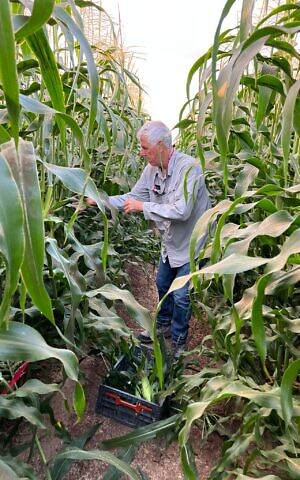Israeli company touts nature-based alternative to toxic fertilizers for crops
By Sue Surkes, Times of Israel, February 13, 2023: https://www.timesofisrael.com/israeli-company-touts-nature-based-alterna...
An Israeli Agtech company that has developed a sustainable way of supplying nitrogen to crops has reported successful results from an early trial in Brazil.
Grace Breeding, based in Rehovot in central Israel, has linked up with a Brazilian university to pilot its NFT Bio-Fertilizer, which it says has the potential to slash the use of polluting synthetic nitrogen, reduce global warming gas emissions, save water, and cut farmers’ costs.
Results from the use of NFT on corn seedlings showed quick germination rates, equal or better plant growth, and more efficient use of natural nitrogen, compared with the synthetic version (urea) used in chemical fertilizers, the company announced.
Crop yields will be measured during the next stage — the field trials.
In September, the company announced the results of NFT field tests in Israel on wheat. These showed an 18 percent improvement in yield, it said.
Plants need nitrogen to grow properly. Without enough of it, they will not grow tall, will bear yellow leaves, and may produce smaller flowers and fruit.
In most of the world, nitrogen is administered to crops via chemical fertilizers. But they cause a wealth of problems.
Algal blooms caused by chemical run-off on a canal in Holland. (Sahehco, CC BY-SA 3.0, Wikimedia Commons)
More than half of the synthetic nitrogen can leach out of the soil into bodies of water, according to Grace Breeding CEO Assaf Dotan.
There, it causes eutrophication (excess algae growth) which can deplete the water’s oxygen, as well as adversely affect people or livestock that drink the water.
Synthetic nitrogen is also highly polluting to produce. For each metric ton of urea produced in the US, Dotan said, 1.84 metric tons of carbon dioxide were emitted into the air, with even higher amounts at factories in China and India.
Grace Breeding’s nature-based solution NFT Bio-Fertilizer seeks to boost crop yields sustainably and strengthen the resilience of plants to climate change.
In nature, plants team up with fungi and bacteria in the soil to convert atmospheric nitrogen into a form that they can use.
Plants that belong to the legume family, such as peas and beans, are especially good at this. They form relationships with bacteria called rhizobium, which form nodules on the plants’ roots — tiny factories where the alchemy takes place.
White nodules on the root of a broad bean plant. Jengod. (CC BY-SA 4.0, Wikimedia Commons)
Corn, in particular, needs large quantities of nitrogen, obliging farmers to buy lots of costly urea.
What Grace Breeding is doing is taking cereals such as wheat and corn, which are not legumes, and preparing them to interact with and benefit from the rhizobium, like the legumes do, even though physiologically, they are not programmed to do so.
A “bioactivator” — a special, patented cocktail of plant materials with anti-inflammatory properties — is administered to the cereals to strengthen them for this relationship.
A rough analogy would be the way that a human patient is prepared so that his or her body will accept a transplant.
While it eventually intends to completely replace the urea, Grace Breeding is currently employing a hybrid approach that uses some synthetic urea, but an eighth of what would otherwise be used.
This is largely because the urea only needs to be applied once, during sowing, rather than four times during the season, which is the norm.
The bacteria quickly multiply around the plants’ roots and are able to take the nitrogen from the atmosphere instead.
The company has decided to focus on Brazil because it is a major corn-growing nation, Dotan said, linking up with Londrina University, in the heart of the corn-growing region there, and a Brazilian company, Gaia AgroSolutions.
Dotan explained that NFT saved carbon dioxide emissions twice — by reducing the need for high-emissions urea production, and by making the plants better at photosynthesis.
Checking corn that has been treated with in Grace Breeding’s NFT biofertlizer in Segula, south central Israel, July 17, 2022. (Courtesy, Grace Breeding)
During the latter, plants combine carbon dioxide, water, and sunlight to create sugars.
“You are fixing more carbon and pushing it into the soil,” Dotan said.
If the corn yields in Brazil are successful, Grace Breeding and its partners will try to get the method certified for the purpose of issuing carbon credits.
Carbon credits are traded in a voluntary carbon market.
They allow governments, businesses and individuals to offset global warming gas emissions they cannot cut at present by investing in projects that provide an alternative to emissions (such as renewable energy) or help to reduce and store them (such as Grace Energy’s NFT, if it is approved). The investment is recognized by the issuing of the credit.
Said Dotan, “Farmers won’t pay for a product just because it’s green. It must provide additional yield and quality and save on costs.”
Dotan worked previously for the Adama chemical pesticide company, known formerly as Makhteshim Agan.
The head of Grace Breeding’s Scientific Advisory Board is Prof. Yoram Kapulnik, an expert in nitrogen fixation, and a former CEO of Israel’s Agricultural Research Organization, the Volcani Center.


